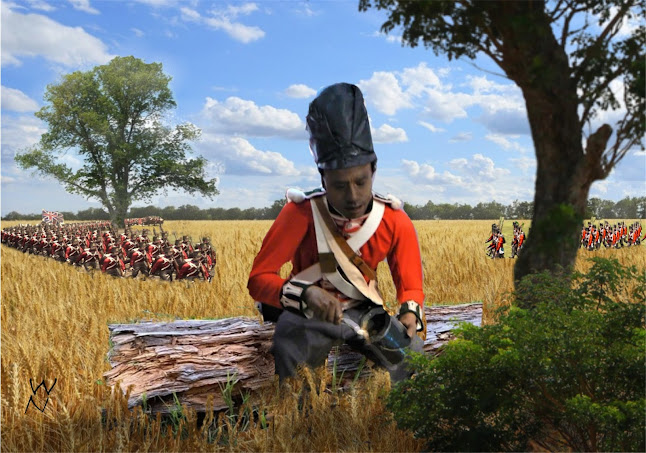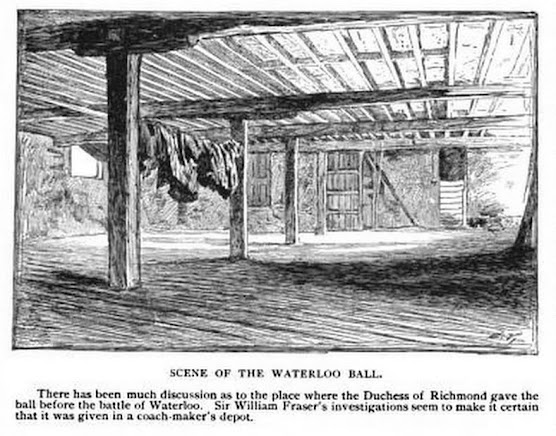George Rose, A Black soldier in the British Army of 1815, and survivor of the Battle of Waterloo
Above - George Rose having breakfast before the Battle of Waterloo starts
Image: courtesy of Waterloo-Napoleon.com
The historical researcher John D.Ellis, has so far put the number of known Black soldiers in the British army during the June 1815 battle and campaign of Waterloo, at nine to date.
One of them was George Rose, who served in General Halkett's 5th British Brigade, as a private in the 2nd Battalion of the 73rd Foot. The British army's soldiers comprised around 40% of the Duke of Wellington's 'Army of the Low Countries', which was comprised of a medley of military forces from several nations and states, including; the Dutch and Belgians (United Kingdom of Netherlands army), Brunswickers, Nassauers, Hanoverians, and the King's German Legion (*part of the British army). There were also several battalions of Indian and Caribbean troops which were stationed at the town of Hal, in that part of the army's flank guard Wellington had left in place several miles away from the Battle of Waterloo.
During the three day Waterloo campaign, the 73rd Foot was involved in heavy action at the Battle of Quatre Bras on June 16th, and again two days later at the battle of Waterloo. Halkett's brigade was in the center of action in both battles and suffered heavy losses - only second among British line regiments to the 27th Foot and its catastrophic casualty numbers . They endured many French cavalry attacks in both battles, and at Waterloo they confronted Napoleon's Imperial Guard infantry in close combat.
George Rose was fortunate to survive the Waterloo campaign, but did not come away from it unscathed. He was wounded twice during the battle of Waterloo - with an injury to his right arm that would affect him in his latter years.
Outside of the Waterloo campaign, George Rose had a lengthy and extensive service in the British military, and had an extraordinary life that eventually came to a full circle.
Born in Spanish Town, Jamaica, sometime between 1787 - 1790, George Rose, was born into slavery, but. like many other Napoleonic Black veterans who came into British military service, he was able to runaway successfully from the doomed fate of Black slaves trapped by brutal Caribbean Plantocracy, and end up as a recruit in the British army.
Having (somehow) made his way to London, Rose became an 18-ish year old recruit in the British 73rd Foot infantry Regiment in 1809. His unit was posted to Ireland for the next four years, and from there, the battalion went on campaign in northern Germany (action at the Battle of the Göhrde, 1813 and with the British force under Ly.General Graham, operating with a Prussian Corps in a combined offensive Netherlands operations in 1814.
Having survived the Waterloo campaign, Rose was still with the battalion during its occupation of France following the final subsequent downfall of Napoleon. The 2nd/73rd remained in France until December 1815, and then returned to England.
He received the Waterloo medal, and in 1817, he transferred from the 73rd regiment, to the famous 42nd Highland Infantry regiment.
Above - Waterloo Medal
As a person of color, Rose had achieved a break through in the
British army, by getting promoted to the rank of sergeant while serving
in the 42nd.
This, despite systemic racial prejudices, which typically blocked such appointments in that era.
Above - Artist depiction of Sergeant George Rose, 42nd Highlanders, 1829.
Image: courtesy of Waterloo-Napoleon.com
It should be noted, that the 2nd Battalion of the 73rd regiment was initially an off-shoot from 2nd battalion from the 42nd Highlanders, formed in 1780,
After nearly 28 years in the British army, Rose was obliged to retire, due to complications from his Waterloo arm injury.
Thereafter, he was awarded a decent sum of money as a Chelsea out-pensioner.
Rose had married and had children, according to meticulous research by John Ellis.
During the eighteen forties decade, Rose preached at the Waterloo Veterans Church, in Glasgow, Scotland. There, he was among friends, including a fellow veteran, and brother in arms, of the 73rd, John McDougall.
Above - Glasgow Green - mid 19th century
Rose returned to his homeland of Jamaica in 1849, where he continued involvement in Methodist ministry activities
He died of old age in 1873..... near Spanish Town - his place of birth.
For more info, visit these resources;
Video about Black Soldiers in the British Army at Waterloo
George Rose Waterloo Soldier by John D.Ellis
George Rose Discharge Papers - National Archives





It's a shame the impression of Sergeant Rose of the 42nd in 1829 depicts him wearing a white hackle plume rather than the regiment's celebrated 'Red Heckle' emblem (As for the broadsword... <}: ->
ReplyDelete